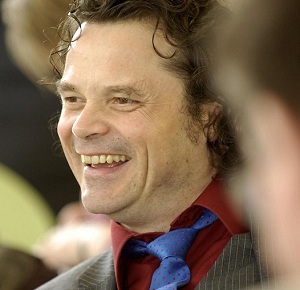
| Home | Future Events | Previous Events | People | Articles | Reviews | AboutUs |
What Has The European Convention on Human Rights Ever Done For Us?
by Caspar Hewett

|

|
There has been talk for some time of introducing a British Bill of Rights which many Tory supporters thought would be one of the first things the new majority Conservative government would do (Cameron has come under attack from the Sun for delaying its introduction). If I thought that such a bill of rights would look anything like its American counterpart (the US Bill of Rights of 1789) I might be on Cameron's side. The US Bill of Rights was created in the capitalism's revolutionary period, when the newly emerging capitalist class was keen to sweep away the restrictions of the old feudal system. It is thus infused with the need for individual freedom from the state. A bill of rights created today is more likely to view every area of human activity as in need of state interference - a legacy as much as anything of New Labour's take on the world. People just donít seem to see the need to protect our individual liberties from the state today.
The language of rights reflects this. It has become increasingly confused in recent years, and the idea of liberty even more so. For me, rights refer to things that are universal, freedoms that we all have, and can exercise. Human Rights are another thing all together. I always say the essential difference between civil rights and Human Rights is that civil rights are things we do have (or aspire to gain), whereas Human Rights are mostly things we ought to have but don't! The civil rights we have were fought hard for and won as freedoms from state control and coercion. They were not given to us freely by ruling elites or the legal system. The Universal Declaration of Human Rights (UDHR) and ECHR, both generated in the wake of the horror of the Second World War, do include many civil liberties, but they do little or nothing to uphold our freedom, so it all feels rather theoretical. The International Covenant on Economic, Social and Cultural Rights (ICESCR) is even worse, as the rights it discusses cannot be exercised by anyone - the right to food, water, housing and clothing, the right to work, the right to strike. Really?
The ECHR is particularly laughable when you examine it in detail as it is full of exceptions (or "protocols"). Look for example at Article 4, which prohibits slavery, servitude and forced labour except
Here's an example very close to my heart. Article 19 of UDHR states that "Everyone has the right to freedom of opinion and expression; this right includes freedom to hold opinions without interference and to seek, receive and impart information and ideas through any media and regardless of frontiers." It would be fantastic if we actually did have this right, but I don't see any evidence for it. From the outrageous libel laws to the culture of 'soft censorship' and so-called political correctness which has run riot in the last few years, it feels as if there are more you can't say than things you can. So, what is Article 19 other than a set of empty words? Similarly, Article 10 of ECHR covers freedom of expression, but is a bit more honest with its myriad of restrictions placed on it "in accordance with law" and as "necessary in a democratic society" such as where those rights interfere with
The right to silence is another one to note. This is the protection we used to have under the law in the UK, which meant that a person who was arrested could refuse to answer questions and that no adverse inference could me made from that refusal. It is interesting that this right (or, strictly speaking, set of rights, since it actually embodies at least six rights) was first established in Britain way back in the 17th Century (a while before the UDHR) and was considered a basic protection for all. It was such a fundamental right that it was echoed throughout the world. In line with this Article 11 (1) of UDHR states: "Everyone charged with a penal offence has the right to be presumed innocent until proved guilty according to law in a public trial at which he has had all the guarantees necessary for his defence." Similarly, Article 6 of the ECHR details the right to fair trial, including the presumption of innocence. Yet, in the UK we lost this right in 1994 with the introduction of the Criminal Justice and Public Order Act. Where once the caution you would hear on being arrested was "You do not have to say anything but anything you do say will be taken down and may be given in evidence," it became "You do not have to say anything. But it may harm your defence if you do not mention when questioned something which you later rely on in court. Anything you do say may be given in evidence."
Here's another. Article 20 (1) of UCHR states: "Everyone has the right to freedom of peaceful assembly and association" and Article 11 of ECHR also protects the right to freedom of assembly and association, including the right to form trade unions. This surely is a universal right - the right of individuals to come together and express, promote, pursue, and defend their ideas collectively. This includes, of course, the right to protest. Yet we clearly don't have this fundamental right in Britain. From the notorious Criminal Justice and Public Order Act of 1994 which introduced legal restrictions on a huge range of activities such as squatting, direct action, demonstrations and even parties to The Anti-Social Behaviour, Crime and Policing Act of 2014 which targets anti-social behaviour, defined in frighteningly loose terms as behaviour causing 'harassment', 'alarm', 'distress', 'nuisance' or 'annoyance'.
There are plenty more examples I could give, but there is no need. The point is, how has Britain's commitment to ECHR helped us to hold on to our civil rights? It hasn't, doesn't and won't. So why would we wish to defend it? I wouldn't bother. What we do need is a robust defence of civil liberties in the current climate when few on any part of the political spectrum are actually willing to defend our freedoms. Like Clegg, I am uncomfortable with the notion of a British Bill of Rights to replace our commitment to ECHR, but not for the same reasons. It is because I am pretty sure that such a bill would reinforce the degraded notion of rights we are already stuck with. On a positive note, withdrawal from ECHR would be an opportunity for those of us who believe in progress to make the case for greater individual freedom and reclaiming rights as things we really can exercise.
Caspar Hewett, Director, The Great Debate
27 May 2015
The Great Debate is a not-for-profit community organisation dedicated to maintaining a space for public discussion through courses, day schools, debates and workshops for the general public on topics ranging from Darwinism and human nature, to free speech and environmental thought. www.thegreatdebate.org.uk
If you would like to comment on this article, or on anything else on
The Great Debate site, you can visit
The Great Northern Debate
facebook page
&/or you can join
The Great Debate facebook group
Follow us on Twitter: @greatdebateuk
| Home | Future Events | Previous Events | People | Articles | Reviews | AboutUs |
© Caspar Hewett, 2015